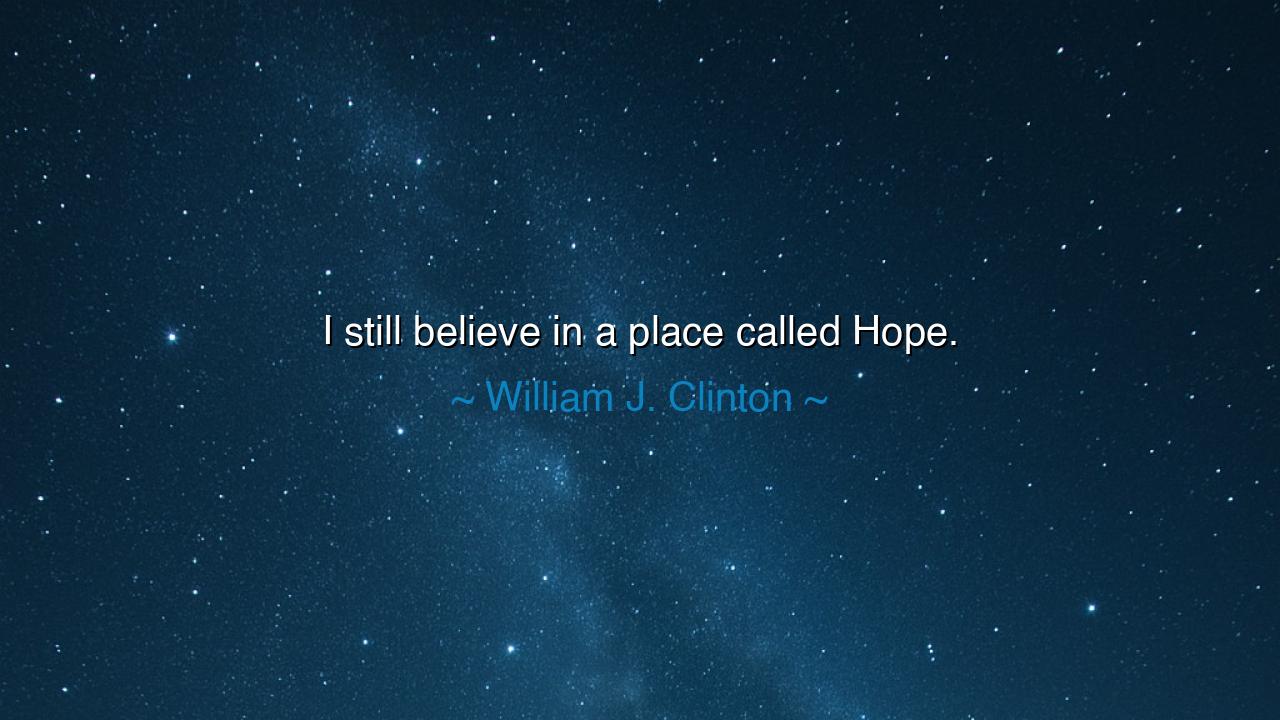
I still believe in a place called Hope.






“I still believe in a place called Hope.” Thus spoke William J. Clinton, the forty-second president of the United States, at the dawn of his rise to leadership. The words, though simple, carry the weight of generations — a song for the weary, a prayer for the striving, a testament to the enduring spirit of hope itself. To those who first heard them, they were more than a phrase; they were a promise. For in those few words, Clinton wove together his humble origins, his faith in renewal, and his conviction that no person is beyond redemption, no nation beyond repair.
The origin of this quote lies not in poetry or politics, but in the small, unassuming town of Hope, Arkansas, where Clinton was born. To many, Hope was just another point on a map — a quiet Southern town, marked more by hardship than glory. Yet Clinton transformed that name into a symbol, a metaphor for the American spirit. When he said, “I still believe in a place called Hope,” he was speaking both literally and figuratively. He was affirming his roots, his belief that greatness can rise from the humblest soil, and his enduring faith that hope — that invisible force — can carry humanity through the darkest storms.
In this statement, Clinton joined the lineage of leaders and dreamers who have understood that hope is not weakness, but power — not fantasy, but fuel. For the wise know that hope is the bridge between despair and action, between what is and what could be. It is what gives the farmer the courage to plant in dry soil, the mother the strength to rise each morning, the builder the will to raise a city from ruins. In every age, those who have believed in hope have shaped the course of nations, while those who have abandoned it have watched the world decay into bitterness and fear.
Consider the story of Nelson Mandela, who spent twenty-seven years in prison, stripped of freedom, power, and comfort. Yet even behind bars, he carried within him a secret strength — the same hope that Clinton invoked. “I learned,” Mandela said, “that courage was not the absence of fear, but the triumph over it.” When he was finally released, he did not return with hatred in his heart, but with forgiveness, guided by the dream of a new South Africa. It was hope, not vengeance, that rebuilt his nation. And so it is with all people — for where hope lives, the future remains possible.
But Clinton’s words also carry a deeper, humbler wisdom: that hope must be kept alive even when the world mocks it. When he spoke those words in 1992, the nation was weary — divided by conflict, shadowed by doubt, and uncertain of its destiny. To say “I still believe” was not mere optimism; it was an act of defiance, a declaration that belief itself is a form of courage. For to believe in hope is to resist the cynicism that eats away at the soul. It is to declare that goodness still matters, that change is still possible, and that light still waits beyond the horizon.
Yet hope, as Clinton and every sage before him knew, is not a thing to be spoken only in comfort. It must be worked for, tended like a fire that can easily fade if left alone. It demands action, faith, and perseverance. Hope without deeds is a hollow dream. The farmer must sow the seed, the leader must fight for justice, the citizen must build what he envisions. Only then does hope become something more than a wish — it becomes destiny shaped by human hands.
So, my child, let these words echo in your heart: never abandon hope, no matter how small or distant it seems. When the night grows long and despair whispers that you are alone, remember that even the smallest light can pierce the darkness. Find your own “place called Hope” — not merely as a town or memory, but as a spirit within you, unbroken and eternal. Protect it. Feed it with your effort, your compassion, your courage.
For as William J. Clinton taught, hope is both a place and a promise — the birthplace of all new beginnings. To believe in it is to believe in humanity itself. And when you live with that belief burning in your chest, you become what the ancients called a torchbearer — one who carries light through the shadows, so that others, too, may find their way home to Hope.






AAdministratorAdministrator
Welcome, honored guests. Please leave a comment, we will respond soon